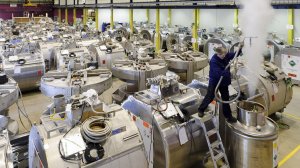Similar to electrical equivalents, gas installations need to be regulated in order to ensure optimum safety practices are adhered to. As gas use increases in South African homes and businesses, awareness needs to be drawn to the safe practice of working with, installing and storing gas. As an electrician would need to be certified, so, too, would a gas installer or practitioner.
The South African Qualification and Certification Committee for Gas (SAQCCGas) is mandated by the Department of Labour (DoL) to ensure all gas practitioners are trained and certified through the four different gas associations.
These associations are the Liquefied Petroleum Gas Safety Association of Southern Africa, the Southern Africa Compressed Gases Association, the Southern African Refrigeration and Air Conditioning Contractors Association and the Southern African Gas Association. Each association plays a vital role in ensuring compliance with the safety regulations within its specific gas markets.
In South Africa, there are four main gas industries that are regulated by the DoL, namely natural gas, liquefied petroleum gas, air conditioning and refrigeration gas and compressed industrial and medical gases.
Essentially, anyone working with gas installations needs to be a registered gas practitioner with SAQCCGas, as it is the body mandated to register all gas practitioners.
Homeowners and Transfers
The SAQCCGas explains that homeowners that have gas installed in their homes are required, by law, to use a certified gas practitioner and request a certificate of conformity (CoC) once the work has been completed. The CoC is required for all gas-type installations. Before home ownership can be transferred, an electrical compliance certification is required. Compliance certification should also cover any fixed installation of air conditioning units and/or gas lines, equipment and appliances.
Similar to homeowners, business owners would need to request a CoC from a registered gas practitioner, says SAQCCGas. “In many instances, installers are working without certification, which means they may not know how to operate with the type of gas your business is using,” the organisation warns.
The committee further points out that liability for any harm or safety contravention would then fall on the business owner, not the insurance company. Further, company owners would not be able to apply for any compensation aid or benefit for employees hurt or for loss of life.
Importance of Regulating Gas Installations
SAQCCGas says gas is a safe product to work with because it is predictable and is easily transported or transferred from one point to the other. “The varieties of use for gas are endless and what makes gas attractive to many is its availability. “Worldwide, gas production is in surplus, and many gases are naturally extracted,” the organisation states.
Despite the relative safeness of gas – compared with other fuels – regulation is necessary because the majority of gas incidents are the result of human error. These incidents can be avoided by more stringent regulation. SAQCCGas notes: “The number of uncertified gas installers is growing and many home- and business owners are not requesting proof of registration.” The organisation notes that proof of registration should be readily available from all registered practitioners in the form of a licence card. The card, similar to a driver’s licence, is issued by SAQCCGas and includes the installer’s name, photograph, unique SAQCCGas number, and the type of gas the installer is permitted to work with.
Consumers should also insist on a CoC from the practitioner on completion of the installation. This is the practitioner’s confirmation that the installation is compliant with all relevant regulations and national safety standards. The use of an unlicensed practitioner and/or the non-issue of a CoC would render the installation illegal and potentially unsafe.
Incidents resulting from poor installation can vary from property damage to loss of life and it is essential that all gas consumers ensure that practitioners used are licensed and issue a CoC. To confirm whether or not a practitioner is indeed registered, one can check the information provided on the SAQCCGas website.
Electricity is no longer cheap for South Africans. Gas is a viable alternative and has the ability to satisfy South Africa’s hunger for a safe and efficient alternative energy.
Edited by: Zandile Mavuso
Creamer Media Senior Deputy Editor: Features
EMAIL THIS ARTICLE SAVE THIS ARTICLE
To subscribe email subscriptions@creamermedia.co.za or click here
To advertise email advertising@creamermedia.co.za or click here













